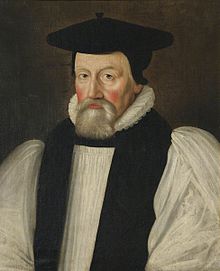Thomas Morton (bishop)
|
The Right Reverend Thomas Morton |
|
|---|---|
| Bishop of Durham | |
 |
|
| Diocese | Diocese of Durham |
| In office | 1632–1646 (Episcopacy abolished) |
| Predecessor | John Howson |
| Successor | Vacant (Civil War) |
| Other posts |
Dean of Gloucester (June 1607–1609) |
| Orders | |
| Ordination | 1594 |
| Consecration | c. 1616 |
| Personal details | |
| Born |
20 March 1564 Pavement, York, East Riding of Yorkshire, England |
| Died | 20 September 1659 (aged 95) Easton Maudit, Northamptonshire, England |
| Buried | Easton Maudit parish church |
| Nationality | English |
| Denomination | Anglican |
| Residence | Richard Morton & Elizabeth née Leedale |
| Spouse | never married |
| Alma mater | St John's College, Cambridge |
Dean of Gloucester (June 1607–1609)
Dean of Winchester (1609–1616)
Bishop of Chester (1616–1619)
Thomas Morton (20 March 1564 – 20 September 1659) was an English churchman, bishop of several dioceses. Well-connected and in favour with King James, he was also a significant polemical writer against Roman Catholic views. He rose to become Bishop of Durham, but despite a record of sympathetic treatment of Puritans as a diocesan, and underlying Calvinist beliefs shown in the Gagg controversy, his royalism saw him descend into poverty under the Commonwealth.
Morton was born in York on 20 March 1564, the sixth of the nineteen children of Richard Morton, mercer, of York, and alderman of the city, by his wife Elizabeth Leedale, and was born in the parish of All Saints' Church, Pavement, York. He was brought up and grammar school educated in the city and nearby Halifax. In 1582, he became a pensioner at St John's College, Cambridge from which he graduated with a BA in 1584 and an MA in 1590.William Whitaker picked him out for a Fellow of the college, and he proceeded to the degree of BD in 1598, and that of DD 'with great distinction' in 1606.
Morton was ordained in 1592, and held the office of university lecturer in logic till in 1598 when he obtained the living of Long Marston, Yorkshire. He was then chaplain to Henry Hastings, 3rd Earl of Huntingdon, Lord President of the North. In 1602, when the plague was raging at York, he devoted himself to the inmates of the pest-house. He conducted disputations with Roman Catholics; Herbert Croft, who became bishop of Hereford, was claimed as Morton's convert to the Church of England.
...
Wikipedia
